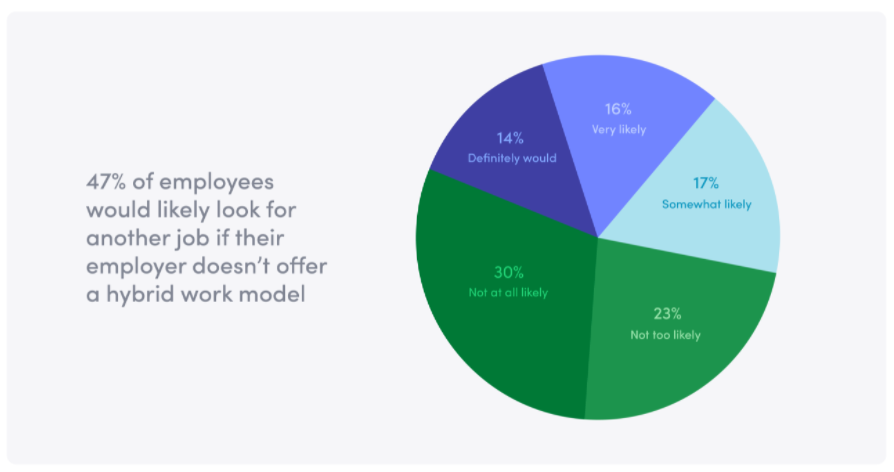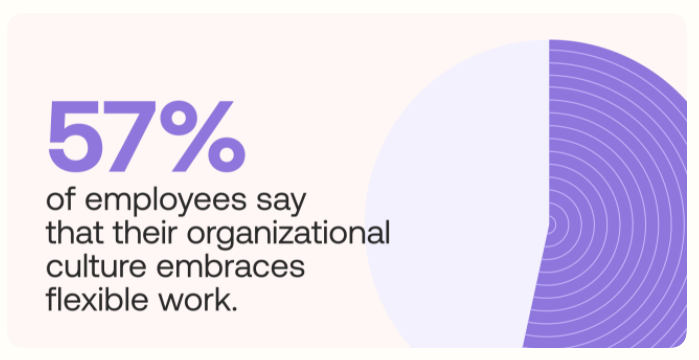4 Ways Teams Can Stay Productive and Creative in Hybrid Work Environments
After nearly two years of working from home, the modern office and work life has evolved.
Now, organizations are starting to welcome staff back into the office, setting up hybrid work environments, or allowing employees to work from home indefinitely. Moving in 2022, it’s all about keeping your teams productive and creative regardless of their office space.
In this post, you’ll discover top tips to keep your hybrid workforce delivering on projects and maintaining a positive work culture. After all, with 63% of high-growth companies embracing a hybrid culture, fostering the right environment gives you a competitive advantage when recruiting new talent.
Ready to get started? Let’s dive in!
Key Takeaways
- Many companies are turning to hybrid work environments to increase productivity and allow employees the flexibility they desire.
- Hybrid workforces enable businesses to reduce overhead costs, improve recruitment efforts, and increase work-life balance.
- Successful hybrid environments include in-person collaborations, equitable review sessions, and asynchronous collaborations for all team members.
Why Do Employees Want a Hybrid Work Environment?
Shifting to a hybrid work model allows organizations to reshape the traditional office landscape and open up the talent pool to create a more inclusive environment.
Hybrid work typically involves allowing your employees the flexibility to work on-site and remote a few times during the week. In fact, 74% of employees would choose to spend at least one day in the office, and 30% prefer working remotely two to three days per week.
More popular among employees aged 18-34, the hybrid model allows employees the flexibility to remain collaborative with team members and work in an environment where they feel the most productive. With 47% of employees saying they wouldn’t want to work for an employer that doesn’t offer a hybrid model, it’s clear that workers desire an environment that fits their needs.
To build a hybrid work model, consider taking the following steps:
- Survey employees to understand their needs and pain points
- Create employee personas to understand how hybrid would feel in real-time
- Invest in technologies that allow your infrastructure to scale
- Develop an equitable company culture for all employees
- Continuously gather feedback to keep optimizing your process

Creative in Hybrid Work Environments — Source: Envoy Chart that States 47% of Employees Would Change Jobs If Not Offered Hybrid Work
Benefits of Offering Hybrid Work Collaboration
If you’re considering bringing your staff back into the office full-time, you might want to take a pause and consider how your employees have been working for almost two years. Many may feel anxious about their safety being back in an office environment or have just found their groove working remotely.
With 57% of employees saying their current organization accepts hybrid work, a mixed environment combines the best of both worlds by giving your employees the control and flexibility they need to outperform. Here are a few additional benefits of a hybrid work environment:
- Enables more work-life balance
- Reduces exposure to illness and fewer sick days
- Cuts overhead and facility expenses
- Offers the ability to hire top talent across the country and globe

The Chart States that 57% of Organizations Provide Flexible Work Options. Source: Qatalog
4 Ways Teams Stay Productive and Creative While Working in a Hybrid Culture
In a hybrid work model, workers are no longer constrained to the typical 9 a.m. to 5 p.m. work model, and instead, can work during the hours they are the most productive. If you want to maximize your employee’s productivity and human potential, follow these tips:
1. Coordinate In-Office Time for the Whole Team
Culture is an essential building block to any company’s success. As an organization, you can structure your hybrid environment by designating specific days for employees to come in or letting them set their schedules. However, if someone decides to commute when the rest of the team stays in, your organization misses a face-to-face opportunity.
Instead, consider proposing regular in-person meetings for the team to collaborate openly and house open work sessions when a high-level project arises. You can also organize monthly or bi-monthly sessions over two or three days where the entire team comes into the office. Maximize this time together by organizing:
- Team bonding activities
- Training sessions or lunch and learns
- Performance and project reviews
2. Develop Equitable Performance Reviews
Your employees might be concerned that those who work in the office are more likely to receive career advancements and promotions than those who prefer the hybrid approach. While you can have more impromptu conversations on-site that lead to more face time, organizations need to create a feedback process to ensure your entire staff feels appreciated and awarded.
To get started, consider categorizing reviews in three ways: the individual job performance, the individual’s ability to work on a team, and how they demonstrate company values. This process allows managers to reward employees creatively instead of only focusing on the output.
Since productivity doesn’t always equal high performance and vice versa, the proper review process enables your employees to focus on developing innovative solutions to your customer’s problems that make a more significant business impact.
3. Utilize Video for All Meetings
While you might be over attending virtual happy hours, hybrid work environments should still default to video usage in conference meetings. Using video not only makes you feel closer to coworkers but also allows your sessions to be less interrupted and more productive.
With fewer interruptions, your team is more likely to chime in and participate, providing more perspectives and opportunities for those innovative sparks to fly. To avoid extreme “Zoom doom” with hybrid team members, consider having fewer meetings and making the ones you hold more productive with an agenda, topics, and action items.
4. Rely on Asynchronous Collaborations
Instead of scheduling endless meetings, democratize conversations to help unlock creativity through better brainstorms. To be successful, allow employees to document brainstorms and enable colleagues to review, reflect, and respond when they feel the sharpest.
Use these before a meeting to intake initial feedback and better understand the next steps. Not only will this allow more people to participate, but it helps guarantee more productive meetings and innovative solutions.
Kickstart Team Productivity Regardless of the Office Setup
Hybrid workforces are the future for organizations looking to optimize employee productivity, performance, and creativity. Since it’s a relatively new territory for businesses, it’s essential to continue to ask for feedback so you can finetune your infrastructure and policies.
Your whole team will need to adjust to new technology, schedules, and coordination, so ensure that you provide the right support and resources to help everyone succeed.


